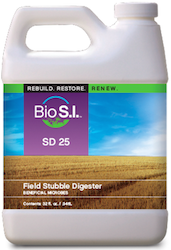While the Midwest is rife with rain, other areas of the country including California and the southwest have been drought stricken for several years. When this occurs, the farmland needs extra help with naturally occurring microbes. Some areas use pile and burn tactics to improve soil health but not only does this strategy not restore the soil with carbon and microboal life, this is not an option for dry lands.
According to the U.S. Drought Monitor, 30-35 percent of U.S. farmers are facing moderate to extreme drought conditions and a cold winter is anticipated. This becomes a good time for farmers to improve microbial activity – microbes are busy during winter months – as microbial activity increases soil temperature between 2-4 degrees when organic matter is available for digestion.
 To see a further improvement on microbial digestion, Bio S.I. Technology recommends the use of SD 25 Field Stubble Digester, a product that capitalizes on soil microbes to digest plant debris left behind after harvest. This product aids the soil’s ability to hold nutrients and improve water efficiency. According to Bio S.I. Technology, without a proper mixture of microbes in the soil, organic matter can’t be totally broken down and the soil becomes clogged with two much undigested organic matter that ties up nutrients.
To see a further improvement on microbial digestion, Bio S.I. Technology recommends the use of SD 25 Field Stubble Digester, a product that capitalizes on soil microbes to digest plant debris left behind after harvest. This product aids the soil’s ability to hold nutrients and improve water efficiency. According to Bio S.I. Technology, without a proper mixture of microbes in the soil, organic matter can’t be totally broken down and the soil becomes clogged with two much undigested organic matter that ties up nutrients.
“SD 25 works beyond the growing seasons to prepare fields for future planting by releasing the nutrients tied up in leftover debris,” explained Bio S.I. founder and CEO Wayne Tucker. “Plant debris can be a real problem for the next planting season for some growers. SD 25 helps farmers re-use nutrients they have already paid for plus the benefits of adding carbon (humus) to help retain water and nutrients in their fields,”
The company literature states SD 25 is an all-natural microbial formula that is safe for organic use. Unlike other stubble digesters, SD 25 is free of preservatives, which makes it safe for use in any setting. After harvest and before the ground freezes, growers should apply the initial application. SD 25 can be used successfully in till and no-till regimens, although it is important to beat the first freeze because microbial activity and decomposition are significantly slowed by cold temperatures. Growers will notice debris is significantly decomposed within 60-75 days.
